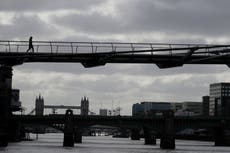Road pricing? Good idea but don’t bank on it happening
The chancellor needs new sources of revenue and he’s started to float ideas. Road pricing is a good one but will provoke fierce resistance, writes James Moore


Chancellor Rishi Sunak needs revenue.
People keep banging on about the current level of borrowing being “unsustainable”, even with interest rates at near zero, and the need to “repair” the public finances in the wake of the pandemic-related spending spree. He appears to be listening.
With austerity (mercifully) now out of fashion, the only way to do achieve that aim is through raising taxes, preferably after a recovery is firmly established.
We’ve seen a number of ideas floated about how that might be accomplished in recent weeks, some via policy papers, others via media drops to test the waters.
They include the possibility of hiking Capital Gains Tax (recommended by a review that’s currently sitting on the chancellor’s desk).
HM Revenue & Customers is looking to crack down on companies that shift their profits to ultra- low tax destinations, a fine idea in principle but something that could get messy given the resources at the disposal of the most egregious offenders who can be counted on to resist.
This brings us to the latest idea doing the rounds: the introduction of road pricing.
The attractions are obvious. Not only could it provide the chancellor with a much needed new source of revenue, it could also deal with the coming decline in vehicle excise and fuel duties that will follow from the phasing out of petrol/diesel powered cars in favour of electric vehicles.
Those declines should be somewhat offset by the measures needed to facilitate the transition. Cambridge Econometrics made a persuasive case that bringing forward a ban on the sale of new petrol engine powered cars and vans to 2030 (as looks increasingly likely) would bring with it economic benefits such as the creation of jobs through, for example, the infrastructure that will need to be installed. Charging points etc. New jobs bring with them new income tax receipts.
But chancellors tend to look at figures like the £28bn the exchequer makes from fuel duty now plus another £12bn from VAT and vehicle excise duty (not charged on electric vehicles) and decide they need more tangible replacements.
Road pricing is already commonplace across the Channel and periodic trips through toll plazas will be familiar to people who make use of French motorways while on holiday. The further you drive, the more plazas you visit, the more you pay. Hey presto, you have something like pricing per mile.
But it’s one thing to pay while visiting another country, quite another to be asked to shell out at home when you don’t currently have to.
Then there’s the UK’s troubled history with tolls.
The most obvious example of road pricing is the London Congestion Charge, priced at £15 a day for those driving within the zone between 7am and 10pm. This is a case where the high cost is more or less justified. London’s air quality is dreadful even with the charge and its roads are still congested.
The M6 toll road, a flat cost of £6.90 for a 27-mile stretch of motorway for a car at peak times, regardless of how much of it you use, is more questionable. It is an example of the problem of setting the price too high; the route has struggled to make money amid resistance from motorists.
It used to cost £5.60 to enter Wales via the Severn Bridge until the widely resented charges were scrapped in 2018 (although there has been talk of reintroducing a levy to reduce congestion).
Perhaps the most controversial tolls, however, were those charged to use the Skye Bridge in Scotland, built via the private finance initiative. The cost reached £11.40 for a round trip back in 2004, leading to angry protests and civil disobedience. A subsidy scheme for locals failed to quell the controversy and the bridge was ultimately bought out from the developers.
Intriguingly the Institute of Economic Affairs, a right-wing think tank, issued a statement in favour of road pricing. It even offered some good ideas for how to proceed: “It is important that road pricing properly reflects the cost of road use and varies with the amount of congestion at any particular time: at some points in the day, the correct price for road use is zero.”
But then its case started to fall apart: “It is also important, if road pricing is introduced, that the opportunity is used to encourage the building of roads by private providers and, indeed, that the privatisation of existing roads is considered.”
Oh dear. The Skye Bridge and arguably the M6 toll roads are examples of the risks of involving the private sector in any such scheme.
Even one constructed sensibly (so without much involvement from the private sector), is going to face formidable opposition.
If you’re going to target tax rises at people who can afford to pay (and motorists are largely in that group) you’re going to face fierce resistance from well-funded and noisy lobbyists.
The Blair government thought about road pricing but then the motoring lobby got to work and the proposals were shelved. It’s a lobby that holds a powerful sway over Tory MPs.
There are, meanwhile, any number of groups ready to indulge in gnashing and wailing should Sunak be tempted to follow through on recommendations to hike CGT.
The chancellor has emerged as something of a star of the pandemic, and become one of the most popular members of the government despite some notable missteps and U-turns (see, Job Retention Scheme, failure to extend).
When he decides it’s time to pay the pandemic piper, some, if not most, of that gloss is inevitably going to fall off.
Join our commenting forum
Join thought-provoking conversations, follow other Independent readers and see their replies
Comments



Bookmark popover
Removed from bookmarks